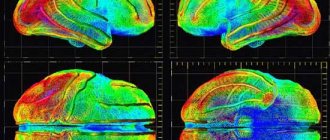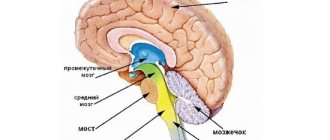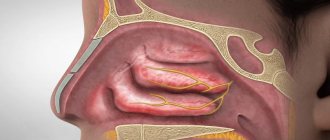Medical information is reliable Checked by Shaidullin Renat Flyurovich
Dementia is a common companion for older people. This is a severe progressive disease that brings significant discomfort to everyday life. The patient almost always does not realize what is happening to him. All concerns related to everyday life and other areas of the patient’s life fall on his loved ones. An unhealthy person needs round-the-clock care; he cannot care for himself. This is a disease whose development can be slowed down by undergoing regular treatment at Dr. Isaev’s Clinic. We use modern recovery methods, bringing back to life even seriously ill patients who were considered hopeless in other medical institutions.
Dementia in older people
Translated from Latin, the word means “dementia.” The main reason is organic damage to the brain, leading to dysfunction of higher nervous activity. The patient's mental abilities decrease, he cannot perform basic calculations, practical skills and knowledge are lost, and it becomes impossible to acquire new ones.
Our clinic specialists are guided by a complete medical history in the treatment of dementia. The clinical picture depends on the location of the brain lesion, its extent, the prerequisites for the development of the disease, age and general health.
The danger lies in the persistence of the disorder; it only progresses over time. Initially, the defeat affects intellectual activity, then disturbances in the emotional-volitional sphere become noticeable. The final stage is the complete and irreversible disintegration of personality.
Organic dementia in children
The clinical picture of organic dementia in children is determined by age. Cerebral lesions suffered at school age are characterized by a contrast between erudition, level of skill development and current cognitive capabilities. Speech is phonetically complete, grammatically and syntactically correct, the vocabulary is sufficient, everyday and school skills are formed. When communicating with a child, the predominance of specific situational thinking is revealed: experienced events are described in detail, judgments are focused on practical actions and results.
The ability to abstraction manifests itself in isolated cases or is absent: the figurative meaning of proverbs and sayings is inaccessible, humor is incomprehensible, and the transfer of experience from one situation to another is difficult. Previously acquired knowledge is retained, but its use is limited, and the actual productivity of thinking is reduced. Attention is unstable, quickly exhausted, memorization is difficult. Affective and personality disorders are determined. The child is emotionally unstable and has frequent mood swings. The nuances of emotions disappear, impoverishment and flattening increase. Severe forms are characterized by a predominance of polar states of pleasure and displeasure. Personality degradation is manifested by a narrowing of interests and a desire to satisfy basic needs.
In preschool and early age children, the symptoms of organic dementia are different. The central place is occupied by pronounced psychomotor agitation. The child is emotionally unstable - reactions of joy are quickly replaced by anger and crying. The emotional sphere is extremely impoverished: a feeling of attachment is not formed, there is no longing for the mother, there are no reactions to praise or blame. Elementary drives are strengthened, gluttony and sexuality develop. The instinct of self-preservation is weakened: the patient is not afraid of strangers, is not anxious in a new environment, and is not afraid of situations involving heights or fire. Outwardly unkempt, sloppy.
Cognitive functions are completely impaired. Perception is vague, judgments are superficial, random in nature, built on the basis of spontaneous formation of associations, repetition without comprehension. Analysis of the situation and transfer of experience are not available - learning ability is reduced, learning new material is difficult. There is no abstract thinking. Severe attention disorders are determined. An intellectual defect and internal disorganization are manifested by a simplification of the game: aimless running around, rolling on the floor, throwing and destroying toys and objects predominates. Accepting the rules and mastering game roles is not available.
Types of dementia
Experts classify the disease into three areas. They are distinguished by the extent and selectivity of damage to the body:
- Atrophic (Alzheimer's) - occur due to malfunctions of the nervous system.
- Vascular – acts as a concomitant disease, the primary source of which is impaired blood circulation in the brain.
- Mixed - combines the features of the vascular and atrophic types.
According to statistics, atrophic type dementia is more common in older women than in men.
The classification of dementia depending on the location of the brain lesion is as follows:
- cortical - the cerebral cortex is primarily affected (Pick's disease or Alzheimer's disease);
- subcortical – pathology affects subcortical structures (Parkinson’s disease with neurological symptoms);
- cortical-subcortical – there are disturbances in both the cortex and subcortex;
- multifocal – damage to the nervous system in all parts.
There are lacunar and total dementia. In the first case, there is damage to the structures responsible for intellectual activity. A person cannot remember what happened to him 5 minutes ago, but at the same time he calmly reproduces in his memory the events of twenty years ago. His short-term memory suffers, and a number of associations are significantly impoverished. His intelligence fails, sometimes even simple things become inaccessible to understanding. The patient is critical of his condition and is aware of the problem. The emotional-volitional sphere is practically not affected; symptoms include increased sensitivity and tearfulness.
In the case of total dementia, the situation looks much more serious. This type of disease is accompanied by gross changes in the intellectual and emotional-volitional spheres. Life interests are lost irrevocably, moral values fade into the background, and there is no sense of shame for unseemly actions. Such patients cannot remain full-fledged members of society, as they are completely maladapted. Our clinic treats suicidal behavior and senile dementia using new, safe methods.
Forms of dementia
- Lacunar form of dementia
It is characterized by peculiar isolated lesions of the structures responsible for intellectual activity. The most pronounced symptom is dysmensia - a violation of short-term memory. Dysmnestic dementia. Maintaining a critical attitude towards your condition. Symptoms of emotional lability, tearfulness, hypersensitivity. A typical example of lacunar dementia is the initial stage of Alzheimer's disease.
- Total form of dementia
The frontal lobes of the cerebral cortex are affected; the cause of the damage may be vascular disorders, atrophic (with Pick's disease) and volumetric processes: hematomas, tumor formations, abscesses. The total form of dementia is characterized by personality disintegration with the presence of gross changes in emotional and volitional activity, complete devaluation of spiritual values, loss of vital interests, with the disappearance of a sense of duty and modesty. The person experiences total dementia and complete social maladjustment.
Signs of dementia
Regardless of what type of disease the patient has, the complex of clinical manifestations of the disease is almost the same. When you first notice signs of dementia, you must urgently consult a doctor in order to make an accurate diagnosis and draw up a treatment algorithm.
Alarm bells that the patient’s relatives should pay attention to are the following factors:
- Impairment of short-term and long-term memory. It manifests itself in the form of an inability to remember new information or reproduce the events of the past day or past years. Patients make every effort to activate their memory, but they fail.
- The patient cannot fully assimilate new information or acquire skills that he did not have before. These people lose the ability to learn, cannot remember the sequence of actions and lose touch with reality.
- Disorientation in space. A person easily gets lost in open areas; he does not remember his residential address and telephone number. Sometimes he cannot clearly answer the question what day and year it is. Such elderly people are often brought to the police by vigilant citizens. Only law enforcement agencies can figure out where an elderly person comes from and where to look for his relatives.
- There is no desire to learn something new, since this information cannot be processed by the brain at the same level.
- The critical attitude towards oneself and one’s actions is lost, the patient ceases to distinguish between what is bad and what is good. He falls into childhood, losing all the signs of an adult.
- There is no planning for the next days and months of your life. Patients with dementia live one day at a time.
The disease is getting worse every day, these manifestations are intensifying. New signs of dementia appear, even more destructive and dangerous.
Signs and symptoms of organic dementia
Since dementia develops in stages, its first symptoms are often missed by both the patient and his loved ones. Attention should be paid to the appearance of the following signs of the disease:
- Changes in behavior, namely increased impulsiveness, irritability, aggressiveness.
- Forgetfulness, at first very mild, is perceived as fatigue (the patient forgets his keys, loses his glasses, forgets to call, and so on).
- Decreased interest in what is happening around, giving up hobbies.
- Deterioration in performance, some drowsiness (these signs are also attributed to fatigue and stress).
- Absent-mindedness, inability to perceive and remember new information.
- Apathy, depression.
- Lack of a critical attitude towards yourself and your appearance.
Since symptoms do not appear all at once, but gradually, it is very difficult to detect the period of onset of the development of organic dementia. Especially if the patient lives away from young relatives. Naturally, in this case, seeking medical help comes quite late, when several brain structures are affected.
Diagnosis of the disease
Suspicion of dementia is a good reason to see a doctor. This pathology is dealt with by a therapist, a neuropsychologist, a neuropathologist, a psychiatrist and a specialist who deals with diseases of the elderly. The diagnosis is made after interviewing the patient’s relatives and the patient himself. Important information is:
- age;
- characteristic signs;
- frequency of symptoms;
- time of onset of pathology.
A comprehensive neurological examination using modern equipment allows us to determine where the foci of pathology are located. The diagnosis is finally made only when symptoms are observed for six months and intensify over time.
A number of psychological tests are carried out to assess cognitive function. They make it clear at what level of consciousness the patient is. During testing the following is established:
- degree of orientation in space;
- features of attention;
- volume of short-term and long-term memory;
- thought processes (abstract, logical);
- the presence or absence of hallucinations, illusions;
- ability to think critically and plan.
Methods for diagnosing organic dementia
Diagnosing the initial stages of the disease is quite difficult. To do this, it is necessary to use techniques that are not used during preventive examinations. A more or less complete picture can be obtained if you use during diagnosis:
- Special testing showing the current level of cognitive and mental functions.
- X-ray.
- Computed tomography.
- Encephalography.
The final diagnosis is made after examination by at least three specialists: a therapist, a neurologist and a psychiatrist, since there is a high probability of developing other diseases that also affect the patient’s psyche.
Dementia causes
The main prerequisite for the occurrence of dementia is damage to the central nervous system. The degeneration of brain cells leads to the fact that the personality is gradually destroyed. With such lesions, the disease develops independently. There are a number of diseases in which senile dementia is one of the associated complications. Among them:
- alcohol abuse in the final stages;
- cerebral atherosclerosis;
- high blood pressure;
- malignant or benign formations of the central nervous system;
- strokes;
- trauma and mechanical damage to the brain;
- infectious, viral diseases (meningitis, encephalitis, HIV);
- renal and liver failure;
- dysfunction of the endocrine system;
- lupus erythematosus;
- complications due to hemodialysis;
- multiple sclerosis.
If the patient has immediate family members who have been diagnosed with dementia, this is an additional risk factor. Diabetes mellitus and obesity can also trigger the development of this disease.
Why does dementia occur?
This condition is associated with old age, but is not part of normal aging. This is a symptom or consequence of serious diseases that lead to damage to brain tissue. The causes of the disease are not fully understood, but a connection has been established with a number of conditions:
- Alzheimer's disease or other diseases in which neurodegenerative processes occur. Brain cells die, which disrupts the functioning of its parts, affecting cognitive functions and behavior;
- cardiovascular diseases. Severe hypertension, thromboembolism, ischemia, strokes lead to organic damage to brain tissue and provoke the development of the disease;
- cell damage as a result of intoxication, nutritional disorders, metabolic failures. This may occur due to complications of alcohol dependence, diseases associated with metabolic disorders, autoimmune conditions;
- traumatic brain injury. May cause direct damage to brain tissue leading to dementia. In this case, with timely rehabilitation, the condition can be reversible due to the development of compensatory functions.
There are a number of factors that increase the risk of dementia:
- hereditary predisposition;
- frequent alcohol consumption, alcohol addiction, as well as smoking, drug addiction;
- excess weight, poor nutrition, and associated metabolic disorders;
- sedentary lifestyle, insufficient amount of physical activity;
- the influence of stress, neurosis, depression, communication problems or lack thereof;
- lack of mental activity.
The reasons why dementia occurs affect its manifestations, symptoms, how quickly it progresses, and the prognosis of treatment.
Dementia symptoms
Dementia belongs to the category of diseases that do not simply go away and progress. Depending on the patient’s current socialization capabilities, three stages of pathology are distinguished. Each of them has its own specific set of symptoms.
- First stage. The patient already has noticeable intellectual impairments. There are complaints that he cannot remember events in his life and forgets his address. A critical attitude towards his condition remains, the person understands that he needs to see a doctor for professional help. Any household activity is carried out in full, self-service remains at a high level. Such patients follow the rules of hygiene, can cook their own food, and clean the house. At this stage, round-the-clock care is not yet required.
- Second stage. The development of the disease is accompanied by severe intellectual impairment. The person does not remember whether he turned off the gas or the iron, closed the doors and other things important in terms of safety. The patient does not realize the criticality of his situation; he does not believe that he is sick. There is a risk that older people with dementia may cause harm to themselves or others through carelessness, without malicious intent. They require regular care; leaving such a person alone is unsafe.
- Third stage. It is the most severe, characterized by complete collapse of personality. The symptoms of dementia are especially pronounced here. Usually such changes in the brain are irreversible. At this stage it is very difficult to stop the further development of dementia. Patients do not recognize their friends, family and loved ones. They cannot feed themselves and must be spoon-fed. Even if in rare cases hunger prompts them to search for food, older people cannot distinguish good foods from bad ones. They cannot maintain good hygiene, so they need constant care around the clock. The ability for logical thinking gradually fades away, they cannot connect two facts together. Verbal communication with others is reduced to zero; they are constantly in silence. The third stage is characterized by apathy and a depressed mood. There is no feeling of thirst or hunger; if the patient is not fed for a long time, he will not ask. Movement disorders lead to the fact that a person cannot perform the simplest movements - chew, swallow, walk. Unfortunately, this stage sooner or later leads to the death of the patient.
Treatment of organic dementia at the Yusupov Hospital
Neurologists at the Yusupov Hospital, together with doctors from other specialties, based on diagnostic data, draw up the most effective individual treatment program in accordance with the possible causes of the disease, the symptoms that appear and the general condition of the patient. Therapy is aimed at stabilizing the process, preventing the destruction of neurons, eliminating negative symptoms, improving metabolic processes and blood supply in the brain.
The basis of therapy is medications that are selected individually:
- for atrophic dementia, acetylcholinesterase inhibitors are often prescribed, which prevent the destruction of acetylcholine, a neurotransmitter involved in the transmission of nerve impulses;
- to improve metabolic processes, biogenic stimulants, peptidergics, and antioxidants are prescribed;
- in order to improve memory and thinking processes, nootropic drugs and vitamins are prescribed;
- Neuroleptics and antidepressants are used to relieve psychotic conditions.
Medicines to prevent hypertension, anticoagulants, NSAIDs, hormonal drugs and other medications are also prescribed according to the patient’s condition. In addition to drug therapy, physiotherapeutic procedures, conversations with a psychotherapist, and exercises to train memory and thinking are used. Such complex therapy makes it possible to achieve the maximum possible effect and socially adapt the patient, improving not only the quality of his life, but also his loved ones and relatives, since caring for patients with dementia is a complex task that takes a lot of time and effort. Detailed information about the disease, prognosis, symptoms and treatment can be found by making an appointment with a neurologist by phone.
Prevention of disease in old age
It is possible to prevent the development of dementia. Prevention measures are necessary in the early stages, without waiting for old age. Similar advice is given by specialists during the treatment of insanity. Doctors recommend taking care of your mental health after 40 years:
- It is necessary to control blood sugar levels, this will avoid the development of diabetes mellitus, against which dementia often develops. Blood vessels will be healthy and elastic until old age. This will have a positive effect on your well-being.
- Constant monitoring of blood pressure will help avoid stroke and myocardial infarction. It is important to periodically take tests to determine the amount of cholesterol in the blood to prevent the formation of cholesterol plaques on the inner walls of blood vessels and reduce the risk of blood clot formation and artery blockage.
- Bad habits, especially chronic alcoholism, often lead to senile dementia.
- Self-treatment of any mental disorders, even mild forms, is strictly prohibited. Very often, patients prescribe tranquilizers and antidepressants for long-term depression. All drugs aimed at suppressing brain activity can only be taken under the supervision of a doctor.
- Traumatic brain injuries are also becoming a risk factor. You need to protect yourself from various mechanical damage to the brain. If there has been a blow or fall in the past, it is necessary to undergo regular examinations with a therapist in order to prevent and develop the disease.
- Physical activity will help keep the circulatory system in good shape. Daily morning exercises, dancing, walking in the fresh air have a beneficial effect on the entire body.
- Positive emotions should become a habit. Frequent stress and neurosis can provoke changes in the cerebral cortex and nervous system, which complicates the treatment of dementia.
- Proper nutrition is the key to health. Your daily diet should include fish, meat, dairy products, and vegetables. It is necessary to avoid foods that contain preservatives, dyes, carcinogens and refractory fats.
- A proper sleep and rest routine will help keep your cardiovascular system in good shape. You need to sleep at least 8 hours a day.
- Training intellectual activity, meeting new people, learning foreign languages will help to delay as much as possible the moment when senile dementia begins to develop.
- Developmental exercises that train fine motor skills of the hands are very useful not only as a preventive measure, but also in the treatment of the first stage of dementia. Good for appliqué, handicrafts, drawing, modeling, assembling puzzles, and bead embroidery.
Disease prevention
Preventive measures are aimed at combating risk factors for the development of diseases in adulthood and old age, such as: depression, vascular diseases, hypertension, atherosclerosis, diabetes, obesity, high cholesterol.
It is necessary to eliminate bad habits such as smoking and alcohol abuse, which can trigger the development of early dementia.
Physical education reduces the risk of developing dementia and slows it down, allowing you to maintain skills that are necessary in everyday life, and helps improve the cognitive abilities of people with dementia.
Nutrition helps prevent dementia. Research confirms the fact that the more vegetables and fruits in a person’s diet at a young age, the lower the percentage of developing dementia in the future.
Early dementia is usually difficult to diagnose. Symptoms such as absent-mindedness, forgetfulness, and inability to concentrate can be explained by chronic fatigue and stress, so it is very important to see a doctor if your cognitive abilities are deteriorating.
Dementia of the young: myth or reality
Although dementia is most often diagnosed in older people, the disease is often found in younger people. At this age, it is very difficult to determine the moment when dementia begins to develop. Lack of timely assistance complicates the disease. Most often, dementia in young people is a consequence of pathology of the nervous system or brain.
Among the reasons are:
- traumatic brain injuries;
- dysfunction of the thyroid gland;
- infectious viral diseases;
- alcoholism.
Chronic alcohol abuse causes vitamin B1 deficiency. This leads to difficulty in perceiving new information and often provokes memory lapses the morning after the feast.
Signs of dementia in young people are associated with the stage of pathology, as well as the intensity of the disease. Each of the three stages has its own specific features:
- Early stage. The disease can remain undetected for a long time. The person continues to go to work, communicate with relatives and friends. Pathology can be suspected by unhealthy forgetfulness, periodic loss of orientation in space and time.
- Middle stage. Symptoms of the early stages of dementia become more acute and worse. Previously acquired household and professional knowledge and skills are lost, and there is no opportunity to acquire new ones. A young man sometimes forgets the names of his friends and does not remember the events that happened yesterday. If he often asks the same questions without remembering the answers he received, this is a reason to urgently consult a doctor. The patient begins to walk aimlessly around the house and cannot find himself in any activity. At this stage, he already needs help with self-care. One of the most unpleasant symptoms is fecal and urinary incontinence. In order for a person with dementia to continue to live a normal life, he requires round-the-clock care.
- Late stage. This is the most difficult stage in the development of the disease, during which the first signs of personality disintegration are observed, and previous symptoms worsen. The person becomes completely passive, apathetic, and needs constant care. Memory and thought processes cease to function; the patient often does not remember his name or how old he is. Orientation in space is completely lost, speech and motor activity are practically absent.
Stages of dementia
Experts distinguish three stages of this disease. Here is their brief description:
- The early stage of dementia is characterized by a person becoming forgetful and inattentive to the passage of time. In addition, at times a man or woman may lose the ability to navigate familiar terrain;
- in the middle stage of the disease, the above symptoms appear more and more often and stronger. They have a profound impact on the patient's life. He may forget about recent events - conversations, meetings, etc., and also constantly ask the same questions, which prevents him from fully communicating with others. The patient cannot navigate the terrain not only outside his home, but also inside it. Patients with advanced senile dementia find it difficult to care for themselves and require assistance even to perform the simplest activities;
- at the late stage of dementia, the symptoms of pathology become more than obvious. The patient loses the ability to normally navigate in space and time, ceases to recognize family and friends, cannot move independently - if he leaves the house unaccompanied, he may get lost. The patient's behavior changes dramatically - he may become suspicious and aggressive. Everyone has probably heard about elderly people who complain to the police about aliens and their neighbors directing harmful radiation at them through the walls, and also believing in conspiracy theories? The reason for this is senile dementia.
These metamorphoses occur to a person due to irreversible changes at the cellular level in his brain. Due to age, the body can no longer provide the brain cells with the amount of nutrients necessary for their productive functioning, which leads to the destruction of neural connections. In addition to the natural aging of the body, the presence of certain diseases in the patient - for example, Alzheimer's disease - can also lead to such disruptions.
Dementia treatment
Experts emphasize that treatment of dementia should only occur in a hospital setting. Self-selected methods of therapy are very dangerous; it is impossible for a non-specialist to calculate the dosage of the medicine and select it correctly. Hospitalization of a patient with dementia is the best way to care for a close relative.
A comprehensive examination of patients with dementia includes:
- the patient undergoing psychological tests;
- conversation with relatives to collect anamnesis of the disease;
- imaging diagnostic methods (CT, MRI, PET).
The doctor selects medications and determines their dosage. He explains to family how to distinguish the signs and symptoms of schizophrenia from senile dementia. Provides necessary explanations regarding the treatment regimen. Provides information about the rules of behavior with the patient. Explains the specifics of patient care. Informs about side effects from prescribed medications. The doctor also recommends periodic examinations in the hospital and at home.
The treatment regimen for dementia is selected individually; in Dr. Isaev’s Clinic there are no standard methods of treating patients. It depends on the stage of the disease, the reasons that caused it, and the general condition of the patient. For thinking disorders, some drugs are prescribed, for severe concomitant diseases of the nervous system - others.
Only round-the-clock monitoring of a person with dementia will help maintain his standard of living at a normal level. If the condition worsens, the doctor promptly adjusts the prescribed therapy regimen. Also in our clinic you can undergo treatment for apathy, which is a common accompaniment of dementia.
Treatment
In medical treatment of dementia, it is carried out comprehensively, taking into account the reasons that caused it, as well as the patient’s health characteristics. For this we use:
- special organization of care, daily routine, nutrition: it is important to ensure moderate physical activity, sufficient rest, proper nutrition;
- psychotherapy and activities aimed at strengthening and restoring memory, speech, fine motor skills, and basic cognitive functions;
- physical therapy to restore normal functioning of the nervous system;
- drug therapy to correct the functioning of the nervous system, metabolic and other processes.
Dementia is considered an irreversible and incurable condition, but its development can be slowed down and negative changes partially compensated if therapy and rehabilitation are properly organized. Doctors will help you do this!
- Online consultations about dementia
- Factors that provoke dementia
- Dementia with Lewy bodies
- Psychoses in old age
- Age-related personality changes
- Treatment of depression in the elderly
- Is it possible to stop senile dementia?
- Treatment of senile dementia
- Dementia treatment
- Symptoms of Alzheimer's disease
- Drug therapy for patients with dementia
- Diagnosis of dementia
- Manifestation of Alzheimer's disease
- Types of dementia
- Parkinson's disease
- Hallucinations and delusions
- Vascular dementia
- Psychodiagnostics of elderly patients
- Treatment options for Parkinson's disease
- Early diagnosis of mental disorders in older people
- Senile aggression: why does it occur, what to do with it?
- Alcoholic dementia
- Mental disorders in old age
- Pick's disease
- Risk factors for dementia
Dementia treatment in Moscow reviews
When choosing a clinic for the treatment of dementia, many relatives of patients are afraid of poor-quality care or cruel treatment of a mentally retarded person. The fears are based on information about old-style state mental hospitals, the conditions of which did not stand up to criticism. On this page you will see reviews from our patients and their loved ones who have already undergone treatment for dementia. Their words will be the best confirmation of comfortable living conditions, good nutrition and proven methods of therapy for older people.
Questions and answers
When does alcohol-related dementia begin to develop?
Dementia due to the abuse of alcoholic beverages develops under conditions of prolonged use of alcohol - 10-15 years. The condition is aggravated by vascular pathology and liver diseases.
If a person periodically forgets the names of his relatives in old age, is this developing dementia or simply senile forgetfulness?
This condition is typical for older people. If there are no additional signs of dementia (decreased intelligence and disturbances in the emotional-volitional sphere), there is no need to worry. It is advisable to consult a family doctor or general practitioner.










